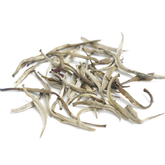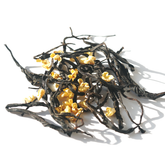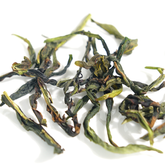Does Chinese Tea Contain Caffeine? How to Reduce Caffeine Intake
Does Chinese Tea Have Caffeine?
Both Chinese tea and teas from other regions, such as Sri Lanka and India, contain caffeine. All six major types of tea—green tea, black tea, oolong tea, white tea, yellow tea, and pu-erh tea—naturally contain caffeine because it is a fundamental component of tea leaves. However, the specific caffeine content varies based on the type of tea, its processing methods, and the brewing time. In contrast, some herbal teas, like chrysanthemum tea, do not contain caffeine as they are made from flower petals rather than tea leaves. Therefore, if you wish to avoid caffeine, you can opt for these caffeine-free herbal teas.

Caffeine Content in Different Tea Types
Generally, the more fermented the tea, the higher its caffeine content. For instance, black tea and ripe pu-erh tea have relatively high caffeine levels, while white tea and green tea contain less. Coffee typically has a higher caffeine content than most tea varieties, and since coffee cannot be re-brewed like tea, the caffeine intake from coffee is usually greater. Here’s a breakdown of caffeine content based on a standard 350 ml cup of tea:
- Green Tea: Approximately 15-50 mg
- White Tea: Approximately 15-30 mg
- Black Tea: Approximately 40-70 mg
- Oolong Tea: Approximately 30-50 mg
- Yellow Tea: Approximately 30-50 mg
- Ripe Pu-erh Tea: Approximately 30-70 mg
- Chrysanthemum Tea: 0 mg (caffeine-free)
- Coffee (approximately 240 ml): About 95-200 mg

How to Reduce Caffeine Intake from Tea
For those sensitive to caffeine, excessive intake can affect sleep quality, making it harder to fall asleep or stay asleep. If you truly enjoy tea, finding ways to reduce its caffeine content is crucial. The half-life of caffeine is about 3 to 7 hours, so to avoid disrupting sleep, it’s advisable not to drink tea in the evening; the best time to enjoy tea is during the day.Here are some methods to reduce caffeine intake while drinking tea:
- Choose Low-Caffeine Tea: Opt for whole tea leaves (like Yunnan big leaf variety) instead of broken tea or tea powders, as whole leaves release caffeine more slowly. NPTEA recommends selecting high-quality original leaf teas from China, which are often hand-crafted without any additives.
- Control Water Temperature: Brewing tea with lower water temperatures (70-80°C) can reduce caffeine extraction. High temperatures accelerate caffeine release, so avoiding boiling water can help minimize caffeine content. Cold brewing tea in the summer is also a great option, as it produces a unique flavor and is less likely to taste bitter.
- Shorten Brewing Time: Reducing the steeping time effectively lowers caffeine content. Longer steeping not only releases more caffeine but can also increase the bitterness of the tea.
Conclusion
All six major types of tea contain caffeine, even those sourced from China. However, it’s important to note that Chinese teas are typically hand-crafted, maintaining higher integrity and lacking additives. Compared to broken teas, whole leaves result in lower caffeine extraction. By controlling brewing temperature and time, you can further minimize caffeine release.
Frequently Asked Questions
1.What has more caffeine, coffee or tea?
Drinking tea usually results in lower caffeine intake compared to coffee, as tea can be steeped multiple times, reducing the overall caffeine consumed.
2.What tea has the most caffeine?
Teas with a higher fermentation level generally contain more caffeine. For example, ripe Pu-erh tea, which is classified as black tea, has a higher caffeine content.
3.Does all tea have caffeine?
As long as the ingredient is from the tea plant, it will contain caffeine.
The six main types of tea—green tea, white tea, yellow tea, oolong tea, and black tea—all contain caffeine. For caffeine-free options, you can choose herbal teas made from plants or flowers, such as chrysanthemum tea, mint tea, or rose tea. These herbal teas do not contain caffeine.
SEE MORE
If you have questions about selecting tea:
Learn-more-about-chinese-tea
If you have questions about the benefits of tea:
Health-benefits-of-chinese-tea
If you have questions about brewing tea:
How-to-brew-loose-leaf-tea






